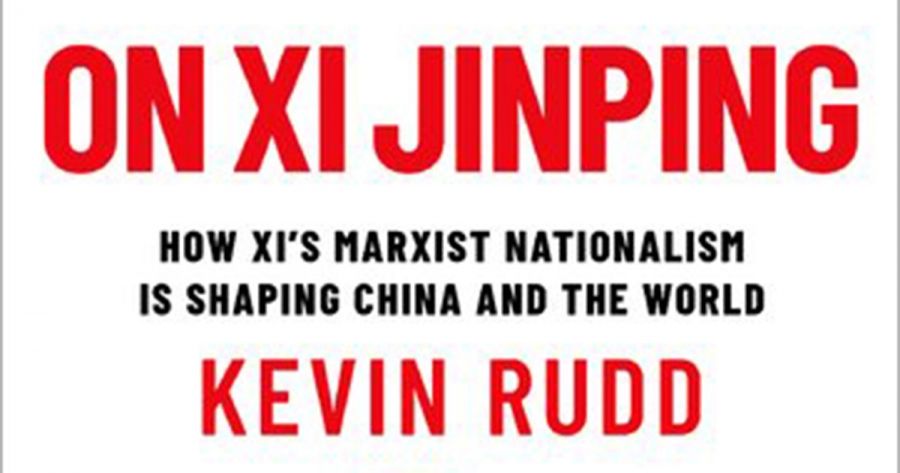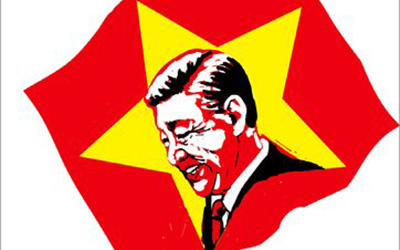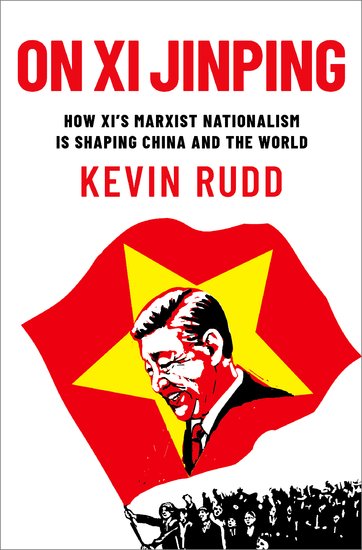
- Free Article: No
- Contents Category: China
- Review Article: Yes
- Article Title: The red thread
- Article Subtitle: Xi Jinping’s ideology of power
- Online Only: No
- Custom Highlight Text:
How does Xi Jinping think? China’s leader since late 2012 is one of the most important but least accessible people in the world. He does not give interviews. His lieutenants do not leak to reporters. His associates do not write tell-all memoirs. The Chinese Communist Party is a secretive organisation that dominates the country’s information ecosystem by censoring speech and crushing dissent. We therefore know precious little about how decisions get made in Beijing.
- Featured Image (400px * 250px):

- Alt Tag (Featured Image): Neil Thomas reviews ‘On Xi Jinping: How Xi’s Marxist Nationalism is shaping China and the world’ by Kevin Rudd
- Book 1 Title: On Xi Jinping
- Book 1 Subtitle: How Xi’s Marxist Nationalism is shaping China and the world
- Book 1 Biblio: Oxford University Press, $54.95 pb, 624 pp
- Book 1 Cover Small (400 x 600):

- Book 1 Cover (800 x 1200):

- Book 1 Readings Link: https://www.readings.com.au/product/9780197766033/on-xi-jinping--kevin-rudd--2024--9780197766033#rac:jokjjzr6ly9m
The cliché, derived from electronic circuit theory, that Chinese politics is a ‘black box’, does not imply total ignorance. Decision-making is opaque, yet the system’s output is clear. Xi regularly issues instructions and policies to guide the party. Government presses published around 300 books of Xi’s remarks between 2014 and 2022. Too easily dismissed as propaganda or merely post-hoc intellectualisation, what Xi tells his ninety-nine million fellow party members reflects his priorities and beliefs.
In his latest book, On Xi Jinping, former prime minister Kevin Rudd adds a worthy new chapter to his life of public service, digesting thousands of pages of ‘Xi Jinping Thought’ so that you do not have to. This ‘at-times-excruciating examination of the primary documents’ leads Rudd to conclude that Xi has an ideological project that represents a radical turn from his recent predecessors. This ‘red thread’ is ‘a new and significant driving force’ in Chinese governance.
Xi’s ideology is described as ‘Marxist-Leninist Nationalism’, or ‘Marxist Nationalism’ for short. He has thus moved Chinese politics to the ‘Leninist left’, Chinese economic policy to the ‘Marxist left’, and Chinese foreign policy to the ‘nationalist right’. Rudd contends that Xi is a true believer in these causes and makes his case across 400 pages of meticulous exegesis of hundreds of official statements from Xi’s first dozen years in office (plus almost 200 pages of footnotes and bibliographies!).
It is a shame that Leninism disappears from the truncated label for Xi’s world view, because it is probably the defining feature of his tenure. His predecessor Hu Jintao (general secretary from 2002 to 2012) was the bland figurehead of a collective leadership that fostered rampant corruption, policy gridlock, and public cynicism. Xi, son of a revolutionary hero, reinvigorated the party’s central role in Chinese life, purging rivals and sidelining the state bureaucracy as he amassed a level of power unseen since Chairman Mao. Endless intra-party campaigns sustain a relentless focus on political discipline and national security.
Xi says that he is ‘concentrating power to do big things’. Domestically, this means shifting China’s economic model from rapid debt-fuelled expansion driven by real estate to a more sustainable ‘high-quality development’ that balances growth with social welfare and technological self-reliance. This is Marxism to the extent that he has intensified regulatory oversight, favoured state-owned enterprises over private firms, and increasingly sought to direct capital toward political goals. Inequality remains high, however, with no sign yet of a major redistributive overhaul.
The biggest thing that Xi wants to achieve is China’s ‘national rejuvenation’ as a country ‘leading the world in comprehensive national power and international influence’. Nationalism is arguably as foundational to the party’s ethos as communism itself; it was established in 1921 by intellectuals intent on ending China’s ‘humiliation’ by colonial powers. Xi has turned up the dial through more assertive diplomacy, massive connectivity projects such as the Belt and Road Initiative, and heightened military activities in disputed territories such as the Taiwan Strait and the South China Sea.
A Xi hell-bent on Marxist Nationalism seems a frightening prospect. Taken to its extreme, this ideology suggests a North Korean police state, a Japan-style economic collapse, and a Putinesque invasion of neighbours – though this is not what is happening, despite the unsavouriness of Xi’s policies.
Some version of Marxist Nationalism may be what Xi wants, but it is not always how he governs. While Marxist dialectics and Sino-centric nationalism are part of Xi’s intellectual tool kit, he also exhibits ‘an abiding strategic realism that still cautions against political and military risk’, according to Rudd. So, is Xi an ideologue, or is he a pragmatist? Steve Tsang and Olivia Cheung, in their recent primer on The Political Thought of Xi Jinping, say that Marxist ideology is more the medium than the message of Xi’s politicking.
Consider China’s ‘zero-Covid’ era from January 2020 to December 2022. During the first two years, after the initial outbreak was contained, China was the tranquil sea in a burning world, recording its fastest growth in a decade in 2021. Xi felt emboldened, declaring that ‘the East is rising, and the West is declining’, sanctioning aggressive ‘Wolf Warrior’ diplomacy against the West, and implementing sweeping rectifications of powerful industries. Then came the highly transmissible Omicron variant, which started spreading locally in early 2022, bringing massive lockdowns for the rest of the year that decimated Chinese commerce and still dampen business confidence. Xi only reversed course after thousands took to the streets across several large cities in protests unprecedented on his watch. Since then, he has tried to restore dialogue with the West, including winding down a trade war against Australia, and steady the economy through stimulus measures and encouragement for the private sector.
The first phase of Covid seems to reveal Xi’s strategic vision, while the second phase indicates that he is rational enough to make tactical adjustments when economic growth or social stability come under serious threat. Rudd mines Xi’s speeches to show that the general secretary himself thinks in terms of strategy and tactics, allowing the party leeway to ease up on his long-term ambitions to meet pressing challenges. Xi takes risks to advance ideological goals, but he is not dogmatic to the point of political suicide. The takeaway for other countries is that deterrence still works; even Xi’s choices are shaped by the economic and military balance of power. (Rudd proposes a ‘managed strategic competition’ between China and the United States in his 2022 book The Avoidable War.)
Neither can we be dogmatic about textual analysis. Rudd demonstrates convincingly that changes to Xi’s language are often a leading indicator of new policy directions, and that we can expect China to become more politically authoritarian, economically statist, and internationally audacious. But predicting the future balance between strategy and tactics in any given area is exceedingly difficult. Party texts did not reflect the end of zero-Covid until after it happened, for example. Xi could also change his mind about other issues.
Good books address great debates. This one speaks to the relative importance of agency versus structure in human affairs. Rudd’s underlying argument is really that individual leaders matter for political outcomes, a subject on which he is unusually well placed to opine. Pessimism about Xi’s current steerage of Chinese politics flowers into a cautious optimism that the party could adopt more liberal policies after this presumptive ruler-for-life ‘goes to meet Marx’. That may not happen soon. Xi turned seventy-one this year, but his father lived to eighty-eight and his mother is ninety-eight. Nonetheless, the policy backflips after Mao’s death suggest that the worse China does, the more scope a successor will have to change course.
This view is somewhat unfashionable in Washington DC, where Rudd currently serves as Australian ambassador to the United States. Former Biden adviser Rush Doshi’s The Long Game (2021) and Trump favourite Michael Pillsbury’s The Hundred-Year Marathon (2015) both argue (in different ways) that the party itself drives China’s grand strategy for global leadership. Some truth resides in both perspectives. The challenge of living with a more powerful China will intensify, especially as its leaders acquire further interests and capabilities abroad, though history attests that top leaders in Beijing can change the political mood. China today is not necessarily China tomorrow.
We cannot peer inside the mind of Xi Jinping. But we can learn from what he says and does. Kevin Rudd shows how taking Xi’s ideology seriously helps us to better understand Chinese politics and to make policies that reduce the likelihood of conflict.


Comments powered by CComment